12 October, 2015
5 Things I Wish I Knew Before Going on Birth Control Pills
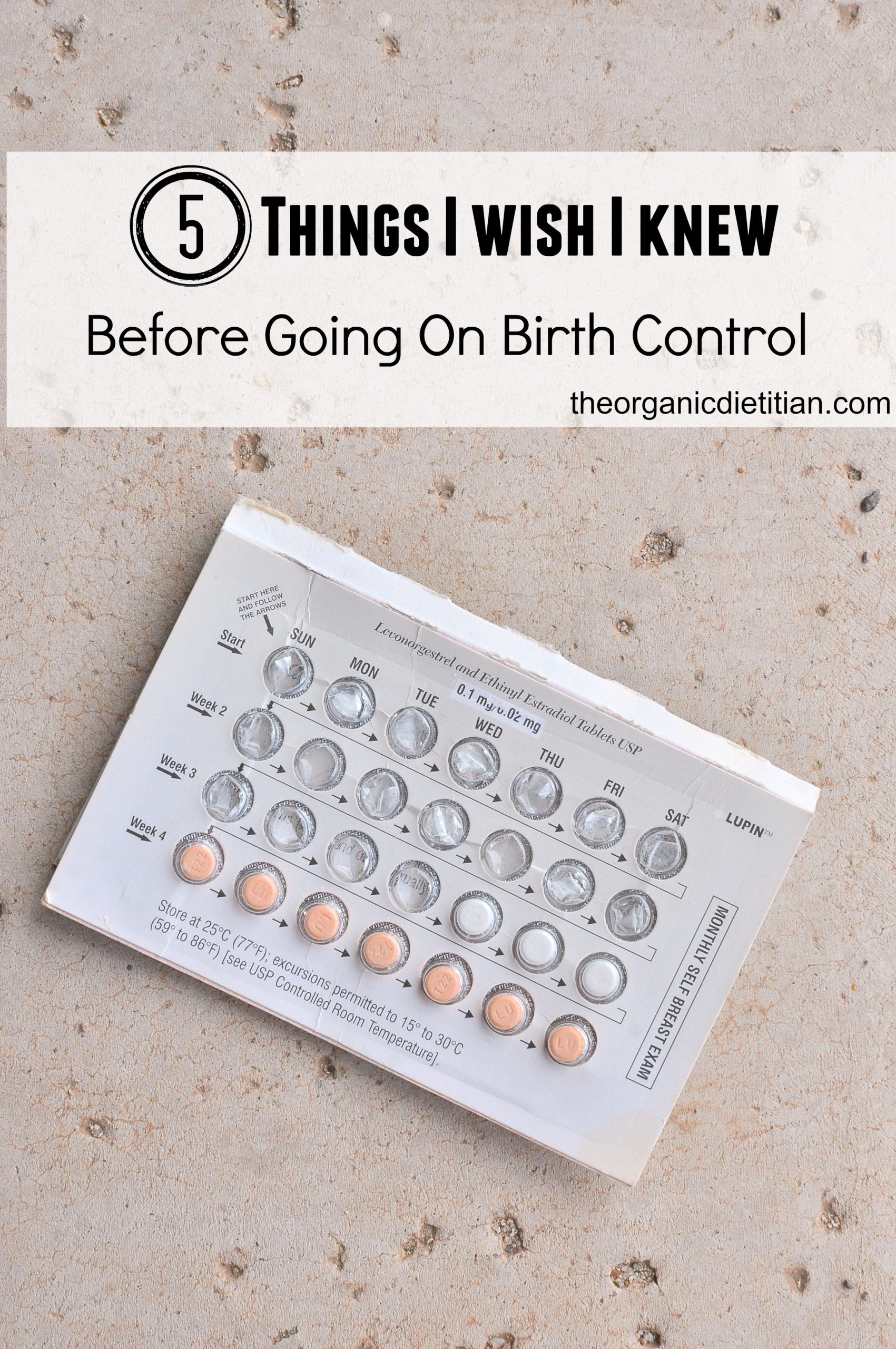
Nearly 80% of women in the United States have used birth control pills at some point in their lives.
I am one of those statistics. I, like many women, reached for birth control pills (BCPs) for many reasons other than preventing pregnancy. For me, birth control pills were prescribed to help regulate my cycle, relieve PMS symptoms, and prevent acne.
All of these issues however are actually classic signs and symptoms of unbalance hormones.
It is now all too common for hormonal birth control pills to be prescribed at the blink of an eye. Speaking from experience, when women are first prescribed oral contraceptives the doctor typically doesn’t even go over risks, side effects, or discuss more natural remedies that may help solve the problems instead. I had taken the pill long-term, for most of 15 years. Yes, the oral contraceptive pill did help regulate my cycle, relieved most PMS symptoms, and reduced some acne, but it never completely went away.
Now we fast forward to just one year ago when I finally decided that the risk greatly outweighed the benefit, and enough was enough. I had dedicated myself to living a holistic lifestyle for the past 3 years and knew in my heart (and my gut!) that I had to get off of this unnatural “remedy” ASAP. There just had to be a better way!
What Happened After I Went Off the Pill?
A few months after quitting the pill my skin completely freaked out! I initially started oral contraceptives mostly to control or prevent acne (which wasn’t that severe in the first place), and now my skin was worse then ever before.
“the hormone receptors in the skin become addicted to the high levels of synthetic estrogen, and they do not adjust easily to normal, human levels of estrogen when the Pill is stopped. It can take months to adjust.”
(source) Our own natural levels of estrogen also begin to deplete due to the high availability of synthetic estrogen, and take some time to “catch up” when the synthetic versions are removed.
There are many side effects that should be taken into account when deciding whether or not to begin an oral contraceptive (or possibly even whether to stay on them or not). However, from my personal experience, here are the top 5 things I wish I knew before going on birth control pills without a second thought.
1. Nutrient Deficiencies
After doing some research, I visited with my traditional medicine physician and asked what her take was on long-term oral birth control and nutrient deficiencies. With no surprise, she looked at me as if I had spoken in a foreign language. If she had done as much research as I had she would have easily found that this is a possible and a potentially serious side effect of long term oral contraceptive use.
Studies suggest (here, here, and here) that many key nutrients are depleted including Folic Acid, Vitamins B2, B6, B12, Vitamin C and Vitamin E and the minerals Magnesium, Selenium and Zinc.
What’s even more interesting is that if you become deficient in certain nutrients from oral contraceptive use, your period may be irregular or even nonexistent if you decide to come off the pill thereafter. This can be especially concerning if you were depleted of these nutrients before even starting the pill, or if you follow a nutrient lacking diet.
2. Damage Gut Flora
In her book , Dr. Natasha Campbell states,
“The effect of contraceptive pills on the composition of bacteria in the gut is devastating. The longer the lady is on the contraceptive pill, the deeper will be the damage on her gut flora.”
It is important to note that she also suggest that antibiotics, processed foods, environmental toxins, other prescription medication and being bottle fed as an infant can negatively impact gut flora.
“But there’s some evidence that oral contraceptives may alter gut microbiota. I see this anecdotally in the clinic. Women who’ve been on birth control for a significant period of time tend to have altered gut flora.”
3. Excess Estrogen
4. Turns Off Hormones
5. Decreases Libido
“The effects on sexual function may stem from the effects of the pill on testosterone, which is thought to help drive women’s sexual desire. Oral contraceptives block testosterone production in the ovaries and increase the production in the liver of sex hormone binding globulin, a protein that attaches to much of the free testosterone in the blood, rendering it inactive.” (source)
Bonus 6. Copper Toxicity
I am adding a BONUS sixth thing I wish I knew before going on birth control. Birth control pills (as well as the copper IUD, ring, patch) can cause copper toxicity. Copper is closely related to estrogen metabolism. Birth control pills and copper IUD’s contribute to excess copper in the body. Copper tends to raise estrogen in the body, and estrogen tends to cause copper to rise. Both copper and estrogen tend to feed one another. High levels of copper can cause numerous symptoms ranging from migraines, PMS, chronic fatigue and allergic reactions.
I wish to empower all women to advocate for themselves, do the research, ask all the questions, and know with a 100% certainty that any medication is the right one for them.



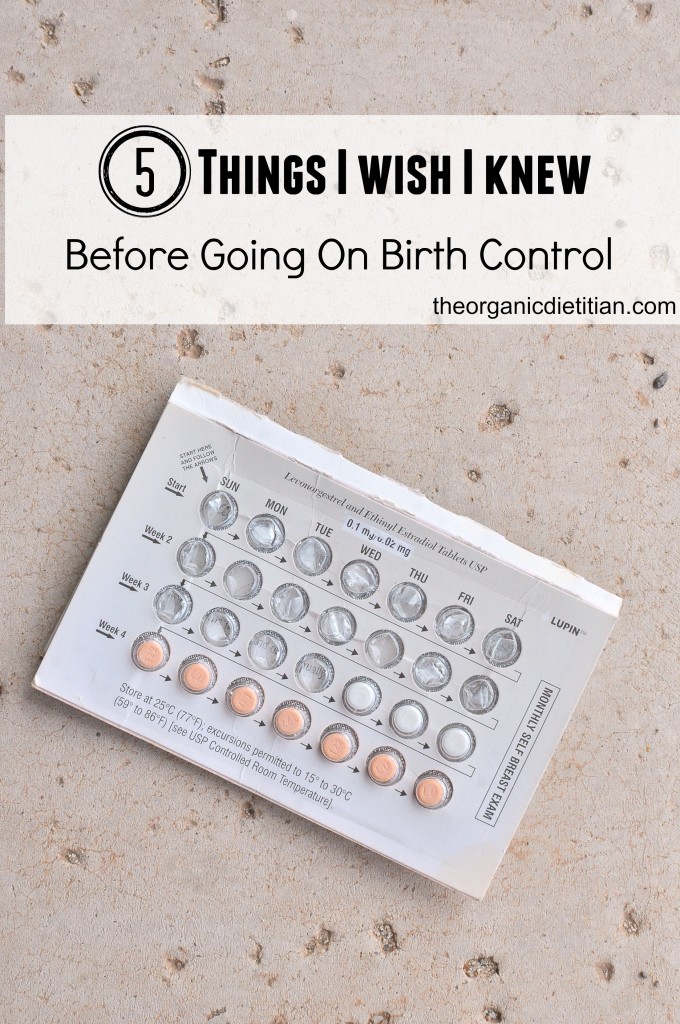
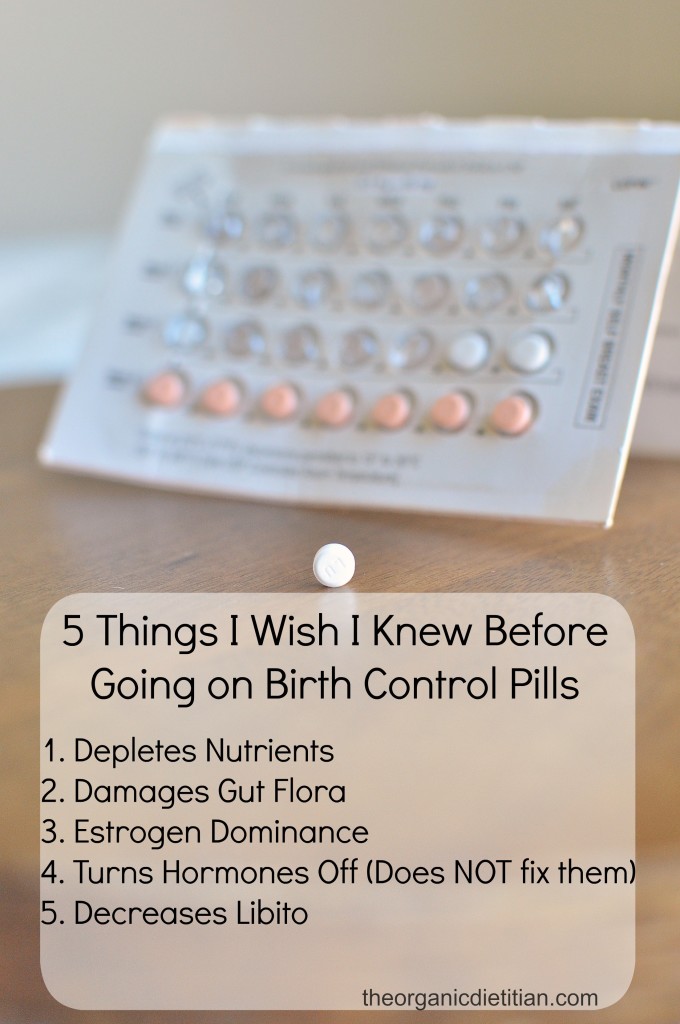

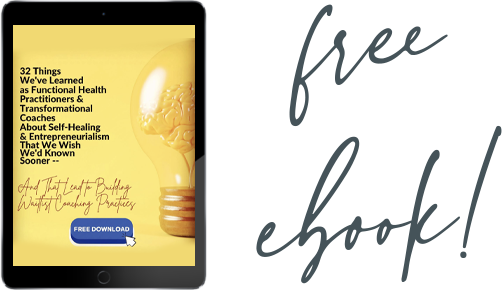

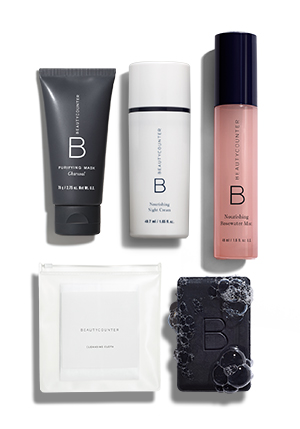



Thank you for researching and writing about this topic. I appreciate all the information. I just decided to stop taking the pill and am a little nervous about what to expect. Its funny how lots of women start taking the pill to help improve unpleasant symptoms when in reality they are creating a whole new set of issues.
You are welcome! It is important for women to know. I will tell you that going off of the pill was the best decision that I made and it wasn’t that easy for me but I am still glad that I did it. If you are worried I would suggest working with someone to help make sure that your diet and lifestyle will support going off and that you are supplementing as being on the pill can be very damaging. I love working with women on this issue so I would be happy to support you in this process. Contact me if you are interested theorganicdietitian@gmail.com.
Hi Sara,
Fir’st I am not using any contraceptive or birth control pills because of the second, I know these pills have side effects. Before I got married and have a child, I made some research and prepare my self of the possible things when taking this or that. Thanks for providing this information, I will be aware.
I am always happy to provide information that helps make importance decisions!
I am 20 and on my first week of bcp (givani) my obgyn believes that I may have endometriosis and they found my uterus is somewhat bicournate (heart shaped) so my periods are hell naturally. I am terrified of all the risks of bcp but if I have endo it seems I have little choice. The only way to know for sure is lacroscopy but I’m still under my moms health insurance (poor college student) and she’d rather me take the pill and save the money. I’m on day 5 and my period has only gotten heavier (12 super plus tampons per day) and I’ve experienced most of the side effects they come with. What would you do in my situation?
Sorry to hear this. I would check out Dr. Lara Briden, she has a lot of information about endo. It is usually inflammatory related and in the end BCPs contribute to inflammation. BCPs may be a short to help that isn’t expensive but in the long run it may cost more money if you don’t get to the root problem. Many doctors believe endo to be autoimmune in nature so BCP is NOT the only option. I personally would never take BCPs ever again for ANY reason because they never fix anything. Hope that helps!
What ended up happening?
Endometriosis is a sign of estrogen dominance and high copper to begin with. The birth control is only a bandaid and solves nothing in my opinion. The damage birth control did to my body is pretty depressing though.
There is excision which is far more effective than ablation for endometriosis. If you get a lap done, it’s best to do it with someone who is more experienced and does excision. Nancy’s Nook on Facebook has a list of doctors.
I have no ovaries, uterus, and I still have endometriosis. It was removed many times. The ablation was in effective for me. I had to have excision after my hysterectomy due to endometriosis growing back. And now estrogen replacement to protect my body has caused endometriosis to grow back when worse and now I have dealing with significant copper toxicity and zinc deficiency. I can’t even tolerate the estrogen now because it of his sick it makes me. My zinc copper balance is double what it should be and my zinc is low despite being “in range.” The standard range includes sick, deficient, and toxic people in the general population. Also, the ratio between zinc copper can explain more.
The zinc copper imbalance though made me really physically and mentally unwell. What is helping the most is eating 2-3 eggs a day, two seconds of zinc rich meat a day (more nutrient dense meat than chicken typically), plenty of veggies, low oxalate legumes to bind to bile, and reducing excess copper in my diet. I am essentially following most of the bean protocol. The soluble fiber in low oxalate legumes binds to bile and detoxes metabolic waste which includes our own hormones, toxins, and heavy metals including copper.
Taking supplements at this point are basically an adrenal whip, gut and GI irritant, lower my potassium, and/or cause intense copper dumping. Food is my best option currently but birth control ruined my life. I do think it made my endometriosis worse than I started out with in all honestly.
I have been off birth control for about 10 years and took some time to heal from it. Yes endometriosis can be a sign of estrogen issues and copper issues but birth control can in part contribute to both as well. Mineral imbalances have root causes. Since this article I have written others on this topic such as this one…https://theorganicdietitian.com/copper-toxicity/
I am curious about copper toxicity when you go off of the pill. Will the sudden drop in estrogen cause a copper dump. I am having horrible symptoms after going off of the pill and trying to push through. And waiting forever for my HTMA test to come back
Hi Samantha, It is generally not a drop in estrogen that will cause a copper dump per day but it can cause copper to go down.